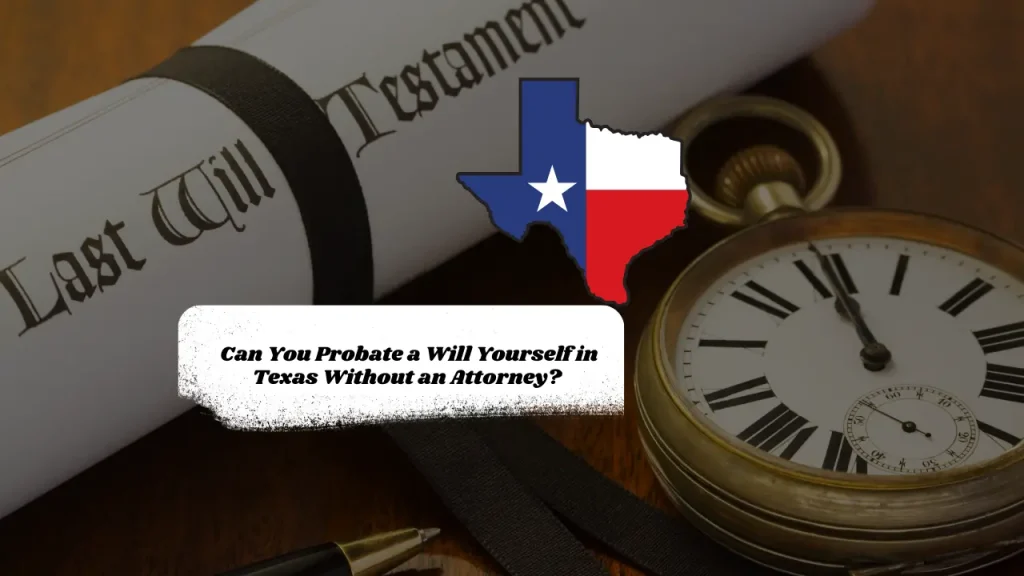Can You Probate a Will Yourself in Texas Without an Attorney?
Yes, you can probate a will yourself in Texas if: The will is valid (signed by the testator and witnesses). There are no disputes among heirs. The estate qualifies for independent administration (common for most Texas estates).
Losing a loved one in Texas is tough enough without the added stress of legal fees. But here’s some good news: Texas law allows you to probate a will without hiring an attorney, even if you’re not a legal expert. Whether you’re handling a simple estate in Houston or a rural ranch in the Panhandle, this guide walks you through the process, pitfalls to avoid, and Texas-specific shortcuts to save time and money.
Table of Contents
Key Takeaways
- Texas permits self-probate for straightforward estates, particularly under independent administration or for small estates.
- Complex cases (disputed wills, significant debts, or out-of-state assets) typically require legal assistance.
- Strict deadlines, such as the 4-year window to initiate probate, apply under Texas Estates Code § 256.003.
When Self-Probate Is Feasible in Texas?
You can probate a will without an attorney if:
- The Will Is Valid: Properly signed by the testator and witnesses, with no challenges to its authenticity.
- No Heir Disputes: All beneficiaries agree to the will’s terms.
- Independent Administration Is Allowed: Most Texas estates qualify, granting the executor autonomy without court oversight for routine decisions.
- Small Estate Thresholds Apply: Estates valued under $75,000 (excluding homestead and exempt property) may bypass probate entirely using a Small Estate Affidavit.
Related article for you:
Can an Executor Resign After Probate? Here’s What US Law Says

Step-by-Step Process to Probate a Will in Texas?
1. File the Will and Probate Application
- Gather Documents: Locate the original will and death certificate. Copies are insufficient unless the original is lost (Texas Estates Code § 256.156).
- Submit Forms:
- Application for Probate of Will (Form OP-101): Filed in the county where the deceased resided.
- Oath of Executor (Form OP-13): Required if named as executor.
- Fees: Costs vary by county (e.g., 274inTravis County, 347 in Harris County).
2. Notify Heirs and Creditors
- Publish Notice to Creditors: Required by Texas Estates Code § 308.054. Publish in a local newspaper for two consecutive weeks.
- Mail Notices: Send copies to all heirs and beneficiaries via certified mail.
3. Inventory Estate Assets
- Use Form IN-1 (Inventory of Estate) to list:
- Real property (e.g., a Houston home, ranchland in West Texas).
- Financial accounts, vehicles, and personal belongings.
- Debts (credit cards, mortgages, medical bills).
4. Settle Debts and Taxes
- Pay valid creditor claims within four months of notification.
- File the deceased’s final federal and state income tax returns.
- Note: Texas has no state estate tax, but federal estate taxes apply to estates exceeding $13.61 million (2024 threshold).
5. Distribute Assets
- Transfer titles for real estate using a Deed of Distribution (filed with the county clerk).
- Close accounts and distribute personal property as directed by the will.
6. Close the Estate
- File Form FIN-1 (Final Account) and Form CIV-100 (Closing Statement).
- Request an Order Closing Administration from the court.
Texas Probate Shortcuts
- Independent Administration
- Request this in your initial application. Allows you to manage the estate without court approval for routine transactions (e.g., selling property).
- Muniment of Title
- Available for debt-free estates. File Form OP-111 to transfer property titles without full probate.
- Small Estate Affidavit
- For estates under $75,000, use Form SEA-1 to bypass probate. Submit to the court with a death certificate and asset list.
When Legal Assistance Is Necessary
Consult a Texas probate attorney if:
- The Will Is Contested: Heirs challenge its validity or interpretation.
- Complex Assets Exist: Oil/gas royalties, out-of-state property, or business interests require specialized handling.
- Medicaid Recovery Applies: Texas’ Medicaid Estate Recovery Program (MERP) may claim assets for long-term care costs.
- Tax Complications Arise: Federal estate tax filings or unresolved IRS debts.
Common Pitfalls to Avoid
- Missing Deadlines: Probate must commence within four years of death (Texas Estates Code § 256.003).
- Ignoring Creditors: Distributing assets before resolving debts risks personal liability.
- Overlooking Homestead Rights: Surviving spouses and minor children are protected under Texas Constitution Article 16, § 50.
Final Considerations
While self-probate is possible for simple cases, even minor errors can lead to delays or legal liability. For estates with ambiguities, disputes, or high-value assets, partnering with a Texas probate attorney ensures compliance with state laws and protects all parties’ interests.
Need Guidance?
- Texas Probate Hotline: (800) 622-2520 (free assistance for qualifying individuals).
- State Bar Lawyer Referral: (800) 252-9690.
This article provides general information and does not constitute legal advice. Consult a licensed Texas attorney for case-specific guidance.
About the Author

Sarah Klein, JD, is an experienced estate planning attorney who has helped clients with wills, trusts, powers of attorney, and probate matters. At All About Lawyer, she simplifies complex estate laws so families can protect their assets, plan ahead, and avoid legal headaches during life’s most sensitive moments.
Read more about Sarah
